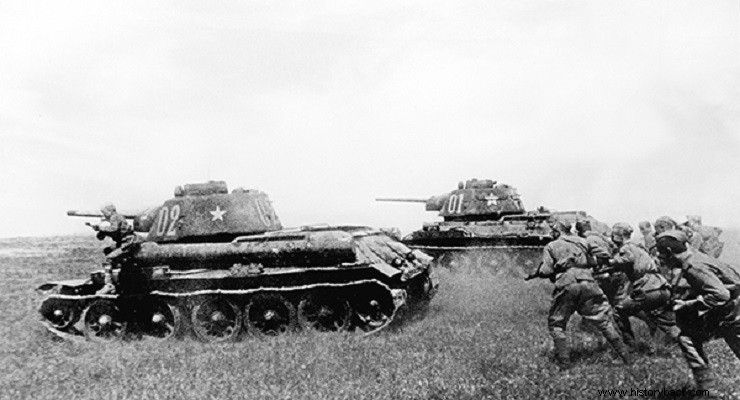
The Soviet offensive in the sector of the German 4th Army began on June 23, 1944, as part of the larger offensive in Belorussia (Operation Bagration). Forces of the 3rd Belorussian Front acted on its northern flank, which broke through the German XXVII Army Corps (SS) of the German 4th Army.
The German XXIX Panzer Corps with the 12th, 31st, 110th and 337th Infantry Divisions (MP), under Lieutenant General Martinek constituted its center and the XII SS constituted its right, covering the city, a "fortress" according to Hitler , of Mogilev, with the 57th and 267th MP and the 18th Grenadier Panzer Division (MP).
The Soviets launched two attacks against the 4th Army, one north at the height of Orsha and one south at Mogilev. Against the XII SS there were only demonstration movements to keep it hooked. The Soviet attack succeeded in breaking the German front in the XXIX Panzer Corps sector, in the sector of the 337th MP. This division covered the right edge of XXXIX Corps, in conjunction with the 12th MP of the XII SS.
The 12th MP was considered one of the best in the German Army and still had a number of veteran officers and non-commissioned officers serving in its ranks. The soldiers came from Pomerania. At the extreme right of the division, the 1/27th Battalion under Major Lem was deployed, covering the western bank of the Proina river. Lem's battalion managed to fend off the Soviet attacks for two days.
Late in the afternoon of June 24, however, Lem was informed that his regimental headquarters, far behind his own positions, had been attacked by Soviet tanks and that his colonel had been seriously wounded. Lemm came to the correct conclusion that further north the defense had collapsed and decided to retreat with his battalion.
“We were passing abandoned gun emplacements and wrecked supply vehicles, apparently destroyed by enemy air power. We were joined by a number of detached soldiers from a relay unit, some messengers and an artillery fire truck. At noon we were attacked by 15 enemy tanks.
“After three days of fighting, without sleep, with night marches, we were exhausted. Artillery fire could be heard from the southeast. We didn't know where our people were". , Lem later recounted, giving with his narration an accurate picture of the state of confusion and to a large extent panic that prevailed in the German camp.
Whole modules were being cut off and cycled without even knowing it. The organic bonds of divisions were breaking down and entire divisions were disappearing without a trace from the German battle formation. Lem's battalion was saved, temporarily, and managed to cross the Dnieper through one of the last bridges that had not yet been blown up. But he was the exception, not the rule. In the meantime the Soviet wedge was also reaching the Dnieper.
The Battle of Mogilev
The Soviet 139th and 238th Rifle Divisions (MT) reached the large river and were ordered to cross it by any means available. The men of the two Soviet divisions were ready to march against the "fortress" of Mogilev. Indeed the infantry began the fight, although only half an hour later the artillery was able to deliver supporting fire.
But the Germans would fight for Mogilev. The first Soviet attacks resulted in the occupation of some houses in the suburbs of the city. However, any further advance was made impossible by the fierce resistance of the Germans. The Soviets waited until 21.00 when the 330th MT had also crossed the river and resumed the attack with three divisions this time.
The new Soviet offensive succeeded in breaking the German defenses. Soviet soldiers reached the center of the city, fighting hand to hand, house to house. Street fighting continued throughout the night in the now burning city. On the afternoon of June 27, Major Lem had arrived in Mogilev with his battalion and had been assigned the incredible mission of defending the "fortress" Mogilev, of which he was called the commander.
Hitler's order had also been signed by the commander of the 12th MP, Major General Bümler , who just two weeks before the Soviet attack had taken command of the division, coming from a quiet staff position in Norway. Bumler was completely inexperienced in the format of the struggle on the Eastern Front and had already become particularly disliked by his men because of his stupid and pointless formality.
When Lem sought him out to protest the stupid order to defend Mogilev, he found him hiding in a cellar, a real moral wreck, on the verge of a nervous breakdown, only repeating the order to defend the city to the last bullet and the last man.
Lem, however, feeling his duty to his men plainly declared to the fear-crazed general that he intended to attempt to escape with his battalion. Bümler insisted that he had received a personal order from Hitler to hold the city. He even called the chief military judge of the division and asked him what was foreseen if he disobeyed Hitler's order. The military judge told him that in such a case he would be court-martialed and sentenced to death.
Lem intervened in the discussion and plainly stated to his general that he would rather see one general dead than condemn 8,000 men to death or captivity! "Do what you think," Bümler was content to answer. When a little later the general was captured by the Soviets, he worked closely with them until the end of the war and later rose to prominence as a government official in the East German regime.
Lem led his battalion out of the city, fighting the Soviets and together they managed to reach Berezina and save themselves. Mogilev surrendered late that night and 3,000 men of the elite 12th MP were captured and about the same number killed.
